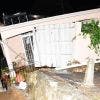
Mainly affecting farm animals like cattle, goats, sheep and pigs, the foot and mouth disease has been the major preoccupation for the population and the government since a week. What are the risks for the people and more importantly, is our livestock under threat? News on Sunday reports.
Publicité
When the first sick animal was found on July 7, veterinarians in Rodrigues were little aware of what they were dealing with. It was only 32 reported cases later that veterinarians realised it was an outbreak of the Foot and Mouth Disease which was spreading among cattle in Rodrigues. Since then, 579 infected animals have been slaughtered in Rodrigues and 300 in Mauritius.
During the Private Notice Question at the National Assembly on Tuesday, the Minister of Agro-Industry underlined that all imported animals from Rodrigues since August 1 have been slaughtered in a quarantine centre at Richelieu. Mahen Seeruttun also pointed out that there is a current ban on meat imports from Rodrigues. Some 4,500 animals will be slaughtered.
The Assistant Director Live Stock and Veterinary Division of the Ministry of Agro-Industry, Dr Deodass Meenowa, explains that no infected animal has been imported from Rodrigues. “We are taking the necessary measures at the Ministry and we are mobilizing all stakeholders to work hand in hand to control the situation,” he says. 144 animals have been infected in Richelieu, 60 infected animals from Vallée-des-Prêtres were slaughtered and infection was detected in Highlands.
According to the veterinary services, five deaths were reported at Vallée-des-Prêtres. He explains that the disease tends to affect more the young cattle. “The disease prevents the animals from growing. It lodges and provokes what we call myocarditis – an inflammation of the heart muscle.” He utters that even the cattle recovering from the disease can still excrete it through milk, stool and saliva. “So this is why we have to be very careful as the situation can get more complicated.”
The disease can be transmitted through air. Dr Meenowa is appealing to the public to take precautionary measures and make sure not to go near the infected farms. “People have to clean and disinfect their car tyres, boots and shoes if ever they have been to an infected farm.” Some 10,000 vaccines are expected from Bostwana this Friday.
Increase meat prices
According to a local butcher, the price of meat has already risen due to the foot and mouth disease. “The price has gone from Rs 110 to Rs 131.50 per pound. This is not justifiable.” The butcher confides that since the news about the foot and mouth disease has spread, customers are barely coming to the shops. “People are afraid of buying meat thinking that it could be infected. Business has been impacted. I believe it will take four months or more for things to get back to normal,” states the butcher.
The Mauritius Meat Authority (MMA) reassures the public that meat on sale come from from Socovia company – which is duly certified from the veterinary department. “No cattle from Rodrigues has been or is being slaughtered in the central slaughterhouse. The majority of slaughtered cattle come from South Africa,” says Rajesh Daumoo, director of MMA.
Nutritionist Advice
Faheema Korumtollee: “Avoid consumption of non-pasteurized milk”
Nutritionist Faheema Korumtollee argues that upto now, no study has been done on the effects consumption of infected meat have on humans. “There is no real risk of infection in humans. People should avoid the consumption of non-pasteurized milk.”
What do farmers say?
Abdullah Yassine: “I was really shocked and I cried”
Yassine is a farmer who has imported cows from Rodrigues and his animals have been contaminated. “Four months ago, I had already bought the animals in Rodrigues and nurtured them. I don’t know how they brought the animals when they knew there was something wrong. On Friday morning, I was informed that no animals will be transported but in the afternoon, they informed me that the animals were on their way to Mauritius. I was happy that I will be getting my animals. On Monday, I paid a transport to go to the port to take my animals but they said the animals were put in quarantine.” Ten of his cattle are infected. “I had invested more than Rs 400,000. Many people had paid me around Rs50,000 to Rs 60,000 for their orders for upcoming Eid-Ul Adha festival. Now, I need to return their money. So, I am waiting for the decision of the government about the compensation.” For Yassine, it is a tough situation. “I was really shocked and I cried. For the first time, I witnessed such a disaster. Fear and grief have overcome us. Some people are angry as may be deprived of sacrificial animals for the upcoming Muslim festival. Other people are afraid to buy local cattle. Many of them will prefer to take those from South Africa as they are not affected.”
Sanjeet Rughoobeer: “There was no other choice than to kill them”
For 20 years, Sanjeet, a resident of Vallée des Pretres, has been working as a cattle breeder for his livelihood. Never in his life, he has been as helpless as he is. In just a few days, I have lost around 66 cattle and 66 sheep, that is around Rs 2 million. “My farm is totally empty,” he confides. He narrates that he went to Rodrigues to fetch some animals. He returned to Mauritius and waited for them to come. “Back in Mauritius, I heard there is some kind of illness in Rodrigues. Once I received the animals, I saw they were a bit weak. I nourished them once they were in my farm. However, after a few days, I saw that the animals’ health got worse. I gave them their injection and medicine after a vet consultation. After the epidemic outbreak, I was sure that my animals also got contaminated. I informed a vet and after consultation it was confirmed, they suffered from foot and mouth disease. There was no other choice than to kill them.” Sanjeet is shattered and is impatiently waiting for the government’s decision. “We hope the government does not leave us in such a misery. We are very sad and I do not what to do. We are cleaning and disinfecting the farm. After that, I do not what steps should I take. The Ministry has banned imports from Rodrigues. All we can do is wait,” he says.

Notre service WhatsApp. Vous êtes témoins d`un événement d`actualité ou d`une scène insolite? Envoyez-nous vos photos ou vidéos sur le 5 259 82 00 !























![[Urgent] Météo : l'avis de pluies torrentielles levé, 302 mm de pluie à Albion](https://defimedia.info/sites/default/files/styles/square_thumbnail/public/inline-images/freecompress-eaa85a67-33ae-4d66-a123-8db0dcd1f87c.jpeg?itok=GuQ9sfRY)
![[Urgent] Pluies torrentielles : les employés du public et du secteur privé ne devront pas se rendre au travail ce lundi 22 avril](https://defimedia.info/sites/default/files/styles/square_thumbnail/public/travail_thumb.jpg?itok=0IbVMA6t)
